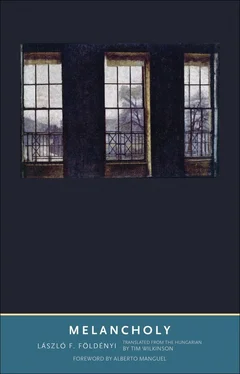(It is evident that we have also failed at the conceptual separation of depression and melancholia — the change in perspective over the past two centuries has permeated language so profoundly that no one can avoid it. The symptoms listed above are not new: they have been mentioned in regard to melancholia for two and a half millennia. What is novel is that the horizons revealed behind the symptoms rarely occupy medical science in the modern era. Even when it speaks about the symptoms of “melancholia,” it understands that condition as depression. The two are not the same, however. Although the symptoms are unequivocally experienced as a burden by the affected person, under the pressures of the symptoms the melancholic possesses insights that point beyond his physical state and direct his attention to the place he occupies in the world. To put it another way, he can turn the body’s symptoms to “profit,” and that remains even if the physical complaints disappear. In the case of depression, that does not necessarily come to pass; indeed, by labeling the person in question as depressed, by the very fact of giving it that name and judgment, he is held back from striving for a deeper understanding of his condition. Melancholia is an opening; depression — a closing in.)
Melancholics have always been accused of laziness, and in former times that laziness was given as the explanation for melancholia. 3Laziness, however, like the sense of loss, is not “objective,” something of which one will take more or less, according to taste (if one defines laziness as work-shyness, that says nothing about it). Laziness is not some kind of “surplus” that is added to the personality, but like disease and suffering, it emerges from the innermost essence of the personality. Laziness is doing nothing; yet if laziness issues from us, then the mysterious attraction to nothing is also inseparable from our essence. Laziness is an abnegation of life on a small scale , and though not requiring conscious consideration, it is an evocation of death similar to a sense of loss. Physicians often report on the peculiar, alienated body movements of melancholics — deep down in this disjointedness lurks a kind of “negative laziness”: although the person in question moves, the movement is not directed at accommodating the body to the surrounding conditions but at creating an autonomous internal space. The “laziness” of melancholics (for example, not getting out of bed for days on end) is a sign of retreat into an “internal world”; 4that “internal world,” however, is utterly a world of death. Their thoughts are directed at death, and the structure of that world repudiates life. 5So-called monoideism (concentration on a single idea) is not necessarily concomitant with degeneration of the mind: the melancholic is aware of everything, but he finds the same thing in everything: the loss that sooner or later is bound to be incurred. Hence the curious phenomenon, hard to interpret in strictly medical terms, that is typical of one and the same melancholic person — that of simultaneous oversensitivity and complete insensitivity. On the one hand, melancholics most commonly complain of painful feelings of senselessness ( anesthesia dolorosa ), of not being able to be either glad or sad. (A melancholic was unable to grieve over her son’s death; she was considered medically cured only when she was again able to feel sorrow and cry.) On the other hand, such insensitivity may be coupled with vibrant sensitivity: anxiety, hypochondria, a perpetual inferiority complex, self-reproach, and sleeping disorders can all be put down to hypersensitivity. This duality suggests that the melancholic experiences the world as a continuous loss, that is, as a continuous death: nothing escapes his attention, and yet everything blurs into one . Depersonalization, with its experience of an internal void, is akin to melancholia, and the suffocating experiences of paramnesia— déjà vu and jamais vu, déjà parlé and jamais parlé , etc. — which are similar to the experience of death, may likewise be connected with melancholia. The melancholic fears himself as well as the world: he fears every event, since he is able to view genesis and change only as incipient death, but he is afraid of himself as well, because he knows that with the passage of time he will increasingly ruin everything to the point that in the end he will irredeemably ruin his whole life by dying. The reason for the frequency of suicide among melancholics is impatience: the melancholic sees life as a path leading to death (could he see it otherwise?), with everything running downhill (a sense of insufficiency). No specific factor triggers suicide: the sole cause, if one can call it that, is life. (There is a story about a melancholic patient who, upon hearing that his grandson had been born, broke into inconsolable wailing.) Life itself is the chief obstacle to true life; and since so-called true life can possess no kind of objectivity, since the world of objects induces melancholia, “true life” itself is pure negativity. As negativity, it can be realized only through destruction or self-destruction; it is only the fulfillment of the possibility of annihilation, latent in everything, that gives meaning to a melancholic’s life. Either the melancholic sinks into himself (in the case of stuporous melancholia, the inhibition may intensify to the point of total immobility) or — which amounts to the same thing — unable to find his place, he paces up and down, wrings his hands, makes a start of things without ever being able to carry them through ( melancholia agitata ), searching in vain for the thing that would satisfy him. The melancholic who wanders around restlessly and aimlessly ( melancholia errabunda ) becomes ever more desperate: the sense of futility that envelops everything turns into fear, 6then the fear is transformed into wild attacks ( raptus melancholicus ): he races up and down and either commits suicide or, to spare others a torment-filled life, turns against those around him. (Krafft-Ebing knew of a case from 1851 of a young man in his twenties in the city of Lyon whom he considered to be melancholic, who stabbed a woman and then turned to her husband, “You did me no harm; neither did she. I don’t even know you,” before going on to demand that he be executed — Krafft-Ebing, Lehrbuch der gerichtlichen Psychopathologie , 85.)
A sense of loss escalating to destruction is a consequence of the depletion of the world: if the world is lost, then I am lost, too. The first sign of depletion is aimless yearning (“This unhappy inclination to all places where I am not, to things which are not mine, lies completely within me,” admits the Romantic writer Annette von Droste-Hülshoff (quoted in Benjamin, “German Men and Women: A Sequence of Letters”), a prime manifestation of which is nostalgia: though the persons in question long for home , the pain felt is shoreless and unappeasable. They surrender to the attraction of nothingness. The word “nostalgia” originally meant “homesickness,” 7and down to the present day it has been seen as one of the “causes” or subspecies of melancholia ( melancholia nostalgica ). The narrow meaning of “homesickness” 8was gradually altered, and it became synonymous with breaking away from orderliness in general. 9The loss of something always results in “disorder” (the accustomed order breaks up), and it is always some unforeseen incident, suddenly breaking into order and threatening it, that the sense of loss implies. (One of Thomas Mann’s finest and most melancholic stories, “Disorder and Early Sorrow,” brilliantly portrays the profound kinship of order-upsetting disarray and grief.) The function of order is to fend off chance, to make the world cozy (one readily finds one’s way about when things have been set right): “I would sooner commit an injustice than tolerate disorder,” Goethe noted in his report on the siege of Mainz about his stopping a mob from lynching a person (quoted in Peter Boerner, Goethe , 67). In this instance, the disorderliness is death appearing in the form of a murder that even Goethe could only delay. No order is able to cover up disorder and threat forever. The greater the order, the more oppressive life is — that applies equally to totalitarian forms of state and petit bourgeois homes. The universal sense of loss that melancholics feel is manifested in their relationship to order and disorder: in his poem The Spleen (1737), Matthew Green advised those who suffer from spleen (that is, melancholia) to seek a cure far from town, in a tranquil, well-ordered rural environment. Writing about mental illnesses a century later, in 1838, Esquirol noted their correlation with social disorder: “In every century, the ruling ideas powerfully influence both the frequency and the character of mental illness. . The ideals of freedom and reform disturbed the minds of many people in France, and it is noteworthy that in the lunacies which have been breaking out for the last thirty years one can recognize the characteristics of those storms which have brought our homeland into upheaval” (Esquirol, Des maladies mentales considerées sous les rapports medical, hygiénique, et medico-légal , 1:43). (Statistics show that between 1786 and 1813, the number of mental patients in France doubled.) Disorder, however, is not pure negativity: it is not an absolute opposite of order, just as illness is not an absolute opposite of health. Disorder is not a fait accompli (not just “disarray,” chaos) but a threat: it appears only in relation to order, which, because it is not a divine formation but the result of human endeavor, is under threat from the very outset — if from nowhere else then from the direction of death, which raises man from the orderliness produced by life. Reinhold Bernhard Jachmann noted the following case with regard to the profoundly melancholic Kant:
Читать дальше












